
Institutes offering a true blue UK degree without the students ever leaving Indian shores are on the rise. Careers360 examines the commercial interests and collaborations between Indian and UK institutes behind these degrees, the visa angle and if you can work in the UK after getting these degrees.
Even after 63 years of independence from the British yoke, the craze for foreign education remains unabated. The dream is every bit exotic -- in wearing the black convocation dress, and in owning up a 'validated' degree conferred on our shores; degrees that the UK institutions award while collaborating with private Indian colleges.
Well, here are some questions we must ask: What is the worth of a foreign degree? Why must students cough up an astronomical 'validation' fee? Are the students getting their money's worth? Is the Degree valid?
Siddharth Pal, after completing Class 12 from Delhi Public Schoool, Mathura Road, enrolled in the Delhi-NCR-based
Institute for International Management and Technology's (IIMT) four-year BBA (Bachelor's in Business Administration).
He passed out in 2009 with an Oxford Brookes Degree in BBA as IIMT has a partnership with the University.
However, with this Degree, Siddharth cannot enrol for a Master's programme in UGC or AICTE-recognised colleges
or universities in India, unless he has a Bachelor's degree from a government recognised institute, first.
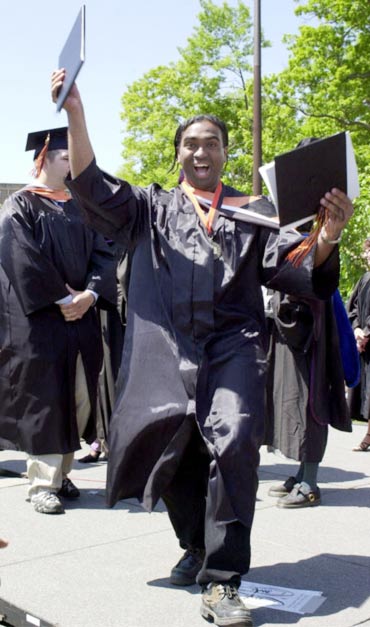
This problem is faced by many students who then find recourse in distance-learning programme. "My suggestion
to students who wish to study further in India is to take up the Delhi-based IGNOU programme simultaneously,"
says counsellor Pervin Malhotra, who is based in Delhi.
Alternatively any Distance Education Council (DEC) approved university would do. But there's a flip side.
According to Malhotra, since students have to cope with two disparate programmes from two separate colleges, their attention usually wavers from the distance-learning programme.
"Their percentage slips and usually the student gets less than 50 per cent, which is not good enough for most entrance exams or for further academic pursuits," she says.
The other alternative is to pursue higher studies from a foreign university.
"I will do an MBA from abroad," says Siddharth. This bright youngster can afford an MBA from abroad. But can everyone?
Are all UK universities in the same league? There are other drawbacks too.
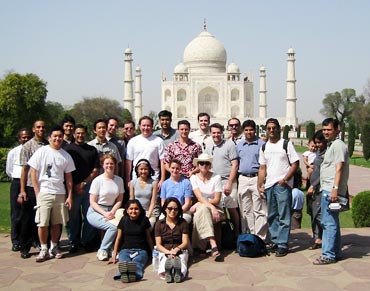
The standing of these private colleges in the home country is also questionable," says Ravi Lochan Singh, Managing Director, Global Reach, an organisation which counsels students.
Most of the UK education providers that have collaborated with institutes in India were polytechnics and received
University status after a change in legislation in 1992 which recognised former polytechnics as Universities. Queen
Margaret University, a partner of Institute of Advanced Management, Kolkata received university status in 2007.
Similarly, Oxford Brookes University was Oxford Polytechnic until 1992. Liverpool John Moores University in alliance with Institute of Finance and International Management, Bangalore was Liverpool Mechanics' School of Arts and later Liverpool Polytechnic before gaining University status in 1992.
The story of Edinburgh Napier University, De Montfort University in partnership with Institute of Advanced Management, Kolkata and Daly College Business School, Indore respectively, is the same. No different is the situation with a host of others.
So, why is it that only 'modern universities' (as they are called in the UK) are keen to gain entry in India?
The answer may be found in a report published by Universities UK, a body of representatives of UK universities.
Titled "The growth of private and for profit higher education providers in the UK" the report states in the context of overseas collaborations that 'it brings in a useful flow of income from accreditation services.'
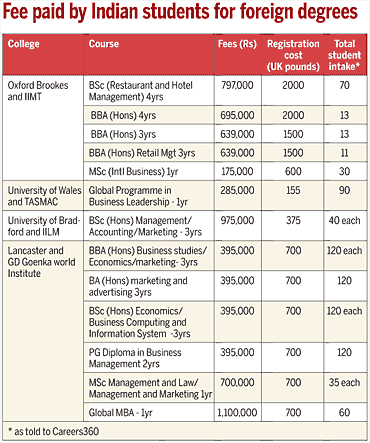
As the table alongside shows, universites earn upwards of one crore rupees merely from validation services, a fact acknowledged by the Quality Assurance Agency for Higher Education (QAA) of the UK.
In its June 2009 audit report "The number of students at IIMT registered on the Oxford Brookes programme in 2008 was 358". That shows a total of 179,000 (Rs 12,530,000) remitted to the UK in just one year by one institution.
In some cases the amount of money they generate from UK/EU students is much lower than that generated from foreign students as the above table shows. For example, University of Wales makes less than half a million pounds in UK/EU fees, but earns 7 million in validation fees.
For the uninitiated, the University of Wales, in collaboration with Training and Advanced Studies in management Communications (TASMAC) is the largest degree-awarding body in the United Kingdom.
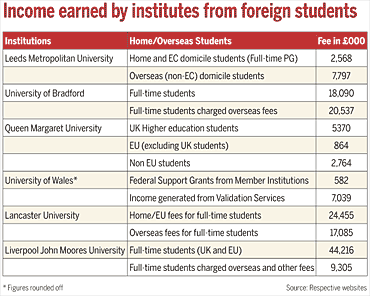
The underlying interest in partnership is purely commercial and aimed at generating income surpluses by 'franchising'
the degree programmes. "Foreign providers don't enter overseas markets to introduce best practices or initiate reform measures," says Malhotra.
Ravi Lochan echoes the sentiment. "Most foreign providers typically collaborate for programmes that are popular and
inexpensive to set up and operate," he says and adds, "Like in Business Management, IT, Hospitality and Tourism,
among others."
The UK provider hardly makes any financial investment. Mr. MK Kaw, former principal advisor (Education), Planning Commission and former Secretary, Ministry of Human Resource Development tells us why.
"They have no cash to spare," he says. "Remember these colleges are second rate even in the UK and are therefore unable to draw students."
In order to generate money, they come to India as it is a market of English speaking students, and has high student numbers," he says.
It's only the "intellectual capital" that is put on the table. Students are denied access to the collaborator's learning
resources and other support devices.
The QAA report of Oxford Brookes and IIMT states the arrangement between the two.
"As registered students, the students of IIMT do not have access to Oxford Brookes' learning resources."
The course curriculum isn't identical as contextualising is advised. The faculty is local and the delivery method is
not the same as that taught in the UK classrooms. So, in effect, the students here don't get the feel and experience of
a UK college.
Mr. Kaw does not shy away from giving his take.
"There should be a minimum number of the UK provider's own faculty members in the academic work," he proposes.
When IIMT suddenly wrapped up its Raichak, Kolkata campus in 2007, the students were asked to seek transfer to Gurgaon campus. QAA approved of IIMT's closure recommendation instead of questioning the closure.
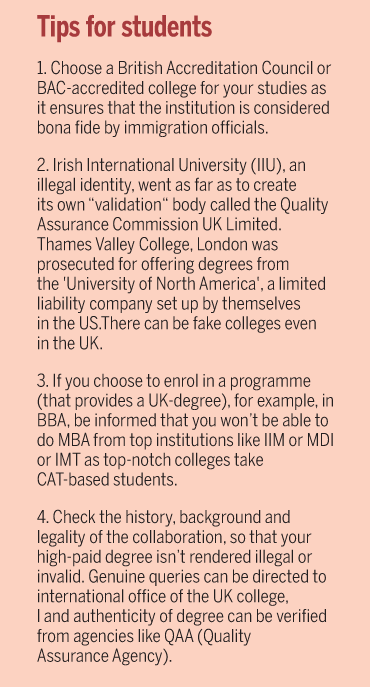
AICTE, the statutory body, introduced regulations in 2005, under which foreign institutions imparting technical
education are required to obtain approval from it. There is currently no legal framework to recognise qualifications
awarded by foreign institutions on the basis of programmes delivered entirely in India.
Yet, UK collaborators are entering into partnerships without the required permission.
The QAA report (June 2009) of Edinburgh Napier University and Institute of Advanced Management, Kolkata states:
"The audit team was informed by Napier that IAM had recently received confirmation from an advocate in the Kolkata
High Court that partnership does not require a separate approval from AICTE."
The AICTE web site doesn't endorse any such claim.
It stipulates, "Foreign University/Institution seeking to operate in India either directly or through collaborative arrangement with an Indian University/Institution shall apply for approval in the prescribed format along with enclosures...".
The Bradford's briefing paper (prepared for QAA audit) lays down that programmes delivered by IILM don't fall within the
purview of the AICTE.
"None of the programmes is subject to accreditation by professional statutory or regulatory bodies in the UK," it further elaborates.
Other provisions by the Council stipulates that foreign institutions submit an annual report giving details of the number of students admitted, programmes conducted, total fee charged, amount transferred to parent country, number of
students awarded degree/diploma. The QAA reports are mum on this: they do not question the UK providers on the lack of this information.
The AICTE has put a whole lot of institutions and the collaborative programmes under the "unapproved list/programmes". The list is comprehensive.
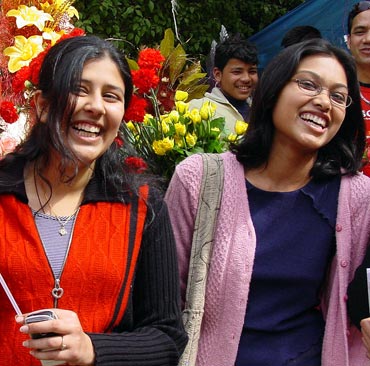
It is almost considered certain that if a student enrols in a twinning programme (collaborative programme for award
of degree/diploma using resources of both), he will obtain a visa. But what if s/he doesn't?
According to AICTE if the student fails to secure a visa he should be enrolled in a similar programme being conducted by the Indian partner institution which is affiliated to a formal university recognised by the UGC. This is done with the intention of providing an equivalent academic qualification for those who are not able to study in the UK.
Neither is there any arrangement between the foreign provider, the Indian partner and the affiliating university concerned to protect the interest of such students, as mandated by the AICTE.
While the top ranked UK universities work under a legal ambit about establishing centres, it is mainly for research
purposes and not for awarding management or other popular degrees. But this practice is also questioned by experts.
"Has India become a hunting ground for talented local mind to be taken as trophy catch to the host countries?," they ask.
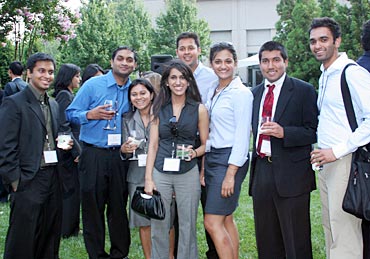
What academic value does a local student derive from the foreign degree?
While the experience of a home university campus can't be replicated, there exists a void even while studying in India
in institutions that are offering such programmes.
"The emerging pattern is that foreign providers align with colleges that have the look and feel of a corporate house and not necessarily an academic institution," says Malhotra.
The objective is to align with an institution where students have the capacity to pay the registration fee. Malhotra strikes out at QAA reports which almost always speak in favour of the UK provider.
"Most of these reports will be favourable as the auditors are given an excellent hospitality by Indian providers, most of whom don't want to let go of the collaboration," she says. So, many shortcomings in the collaboration are not addressed, she adds candidly.
There are areas that need upgradation to offer a certain quality of education. But the partnerships don't have foreign faculty of home campuses teaching Indian students. At best, there is one or two getting to-know-you classes, while on an India visit.
University of Wales in alliance with TASMAC, for imparting Global Programme in Business Leadership (and not MBA), says that no such teaching arrangement exists; neither there is faculty nor student exchange programme.
University of Wales does not validate TASMAC's MBA programme, however, they charge a fee of 155 for completing the dissertation with the University of Wales, by students. So in reality students don't gain any value addition.
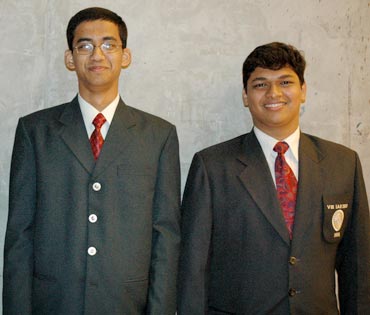
One attraction for such degrees is to obtain work experience in the UK. The fact, however, is that the UK market doesn't give much importance to such degrees.
"When it comes to employment, the fact of the matter is the EU students are preferred to Asian students," says Shivani Manchanda, a Mumbai-based counsellor.
In India too, the entry level salaries are not enviable because the students hardly get paid more than Rs 10,000 per month on an average.
And what about the department that confers the degree?
The University of London, which partnered with Bharti Associate company Centum Learning, awards degrees from External System.
As a student says, "University of London's external degree is not acknowledged by most of the UK employers."
Until these UK providers bring in real value, students must understand the nuances of the degree and take an
informed decision.